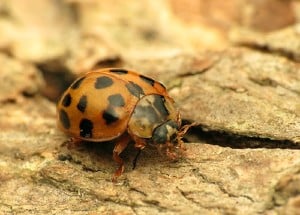Asian beetles or Asian ladybugs are a ladybug specie that can overwinter in warm places to keep eating aphids for up to 3 years. Asian ladybugs were imported to the US around 100 years ago to reduce the population of aphids.
Unfortunately, they’re not as beneficial as they used to be. They’ve already overtaken the native ladybug populations and invade more and more households around the continent, so it’s important to learn how to get rid of Asian beetles if you see them inside.

What are Asian Beetles
Asian Beetles’ appearance is very similar to average ladybugs, so it can be quite difficult to tell one from another if you don’t know what to look at. To identify an Asian bug, you should look for a white M-shaped mark on the area right above the beetle’s head.
It’s the easiest way, and it always works. The mark may look differently, but average ladybugs don’t have such an area behind their heads at all.
The lifecycle of a single beetle can last up to 3 years (usually 2 years). The population of the specie grows every year because there are very few natural enemies to the insect. In addition, it can produce several generations during the year. Fortunately, they don’t replicate indoors!
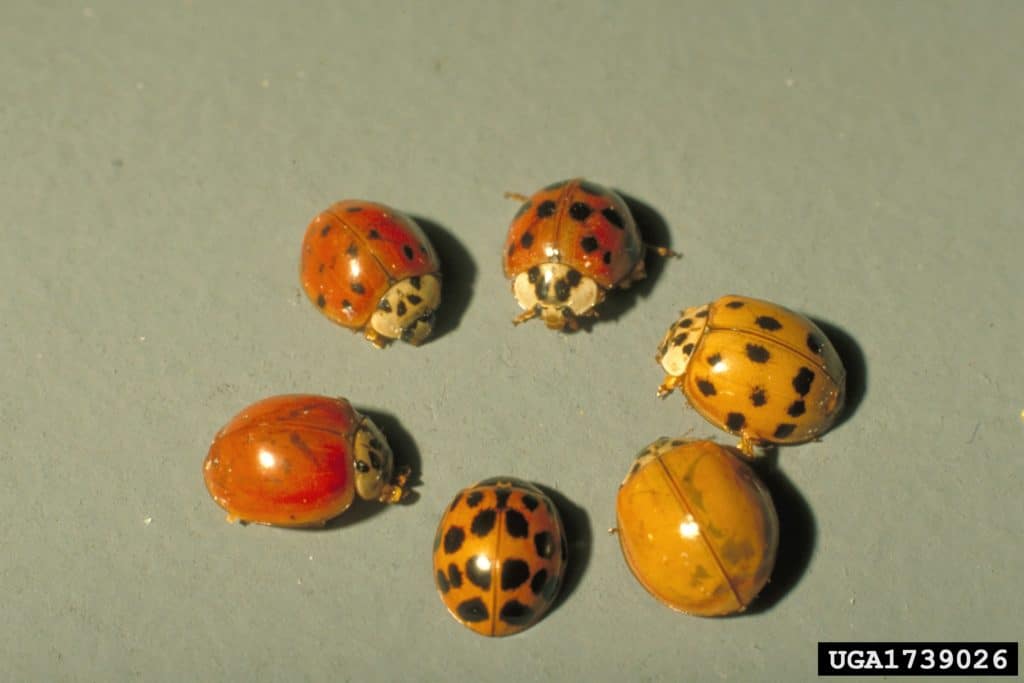
Ladybugs VS Asian Beetles
Native ladybugs are harmless insects. Similarly to them, Asian beetles eat garden pests, which is definitely good. On the other hand, native ladybugs won’t ever bite you, while Asian ladybugs do it quite often.
Both insects can hide in houses to hibernate during winter. There’s no need to destroy a ladybug swarm if it’s doesn’t affect the inside part of your household. I also recommend to catch and transport them to better places if possible or just let them survive.
At the same time, the nation will be thankful if you kill populations of Asian beetles as there are too many of them in the country, and they interfere with the initial ecosystem because of their aggressiveness and higher survivability.
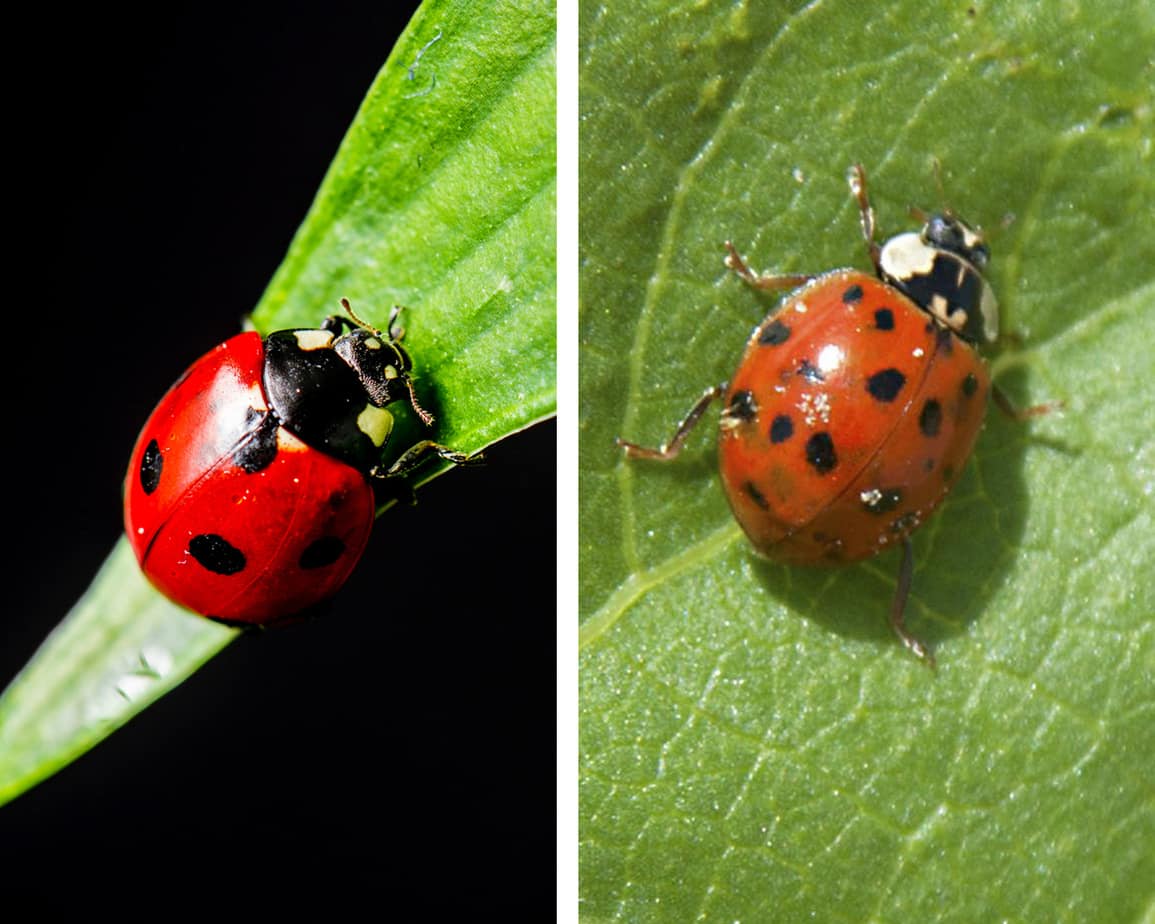
What Attracts Asian Beetles
Asian lady beetles are instinctively attracted by bright colors, including yellows, whites, and greys. They also enjoy places with high amounts of direct sunlight. They never get inside houses if there are no cracks in window and door frames and other parts of the house.
If there’s at least one crack, they may find it attractive to overwinter inside. They’re very sensitive to warmth and leave traces to tell their mates to follow along to better places.
Asian Beetles Dangers
Unlike the average native North American ladybugs, Asian beetles are much more aggressive and can bite you. They don’t carry any diseases, but some people are allergic to their bites and secretion. The yellowish liquid can cause mucous irritation, itching eyes, cough, and hives.
If a dog eats the bug, it will face an upset stomach and mouth skin corrosion (as they secret out the liquids inside). There’s no need to worry about fatal injuries as your dog cannot eat a lot, but it’s better to avoid such consequences.
Other nasty effects include those smelly yellowish stains that they leave here and there. If an infestation occurs, they can really mess up the surfaces around your house.
[su_note note_color=”#e5e2d4″]Related post: How to Get Rid of Caterpillars [/su_note]
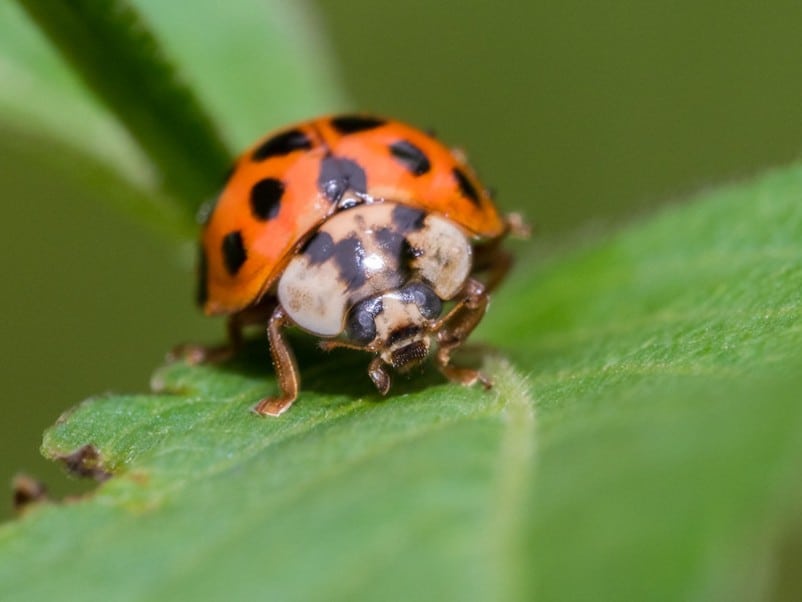
How to Get Rid of Asian Beetles
First of all, I’d like to tell you how to eliminate Asian beetles inside your house. If you notice any signs of an infestation, you should act as fast as possible. Asian ladybugs are excellent communicators.
They frequently leave spots of a yellowish liquid that serves as navigation for other beetles. That’s why they migrate so orderly and quickly. Learn the most effective methods to get rid of them quickly.
Vacuum
One of the most common natural ways to get rid of Asian beetles is to vacuum them up. This method is quick and doesn’t kill the vast majority of the bugs. You can later set the insects free in your garden if aphids eat your plants, or burn them with the bag.
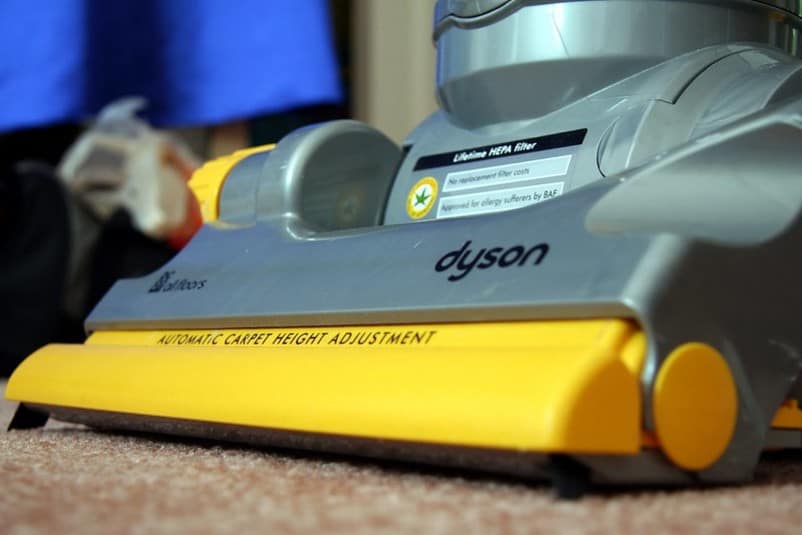
Use Indoor/Outdoor Chemicals
This is the most effective way to stop an Asian beetle infestation. I recommend you to look for remedies that are relatively safe and effective enough to kill the bugs quickly. I prefer using dedicated Asian beetle killers in homes and yards of my customers.
The most effective bug killers usually include bifenthrin, cyfluthrin, cypermethrin, deltamethrin, and permethrin. Look only for those remedies that are tested by people you trust or have safety certifications for indoor and outdoor use. Both can be harmful to pets, so it’s important to keep them away until the liquid gets dry.
Powder Diatomaceous Earth
This cheap natural killer can help you treat hard-to-reach places by powdering the earth into cracks and narrow holes. Diatomaceous earth dehydrates bugs and can be a good repeller as well. You can use it almost everywhere. Your pets and children won’t suffer.
Proper ventilation is necessary anyway. And avoid using ‘food grade’ diatomaceous earth that’s not tested for pest control purposes.
[su_note note_color=”#e5e2d4″]Related post: How to Get Rid of Boxelder Bugs [/su_note]
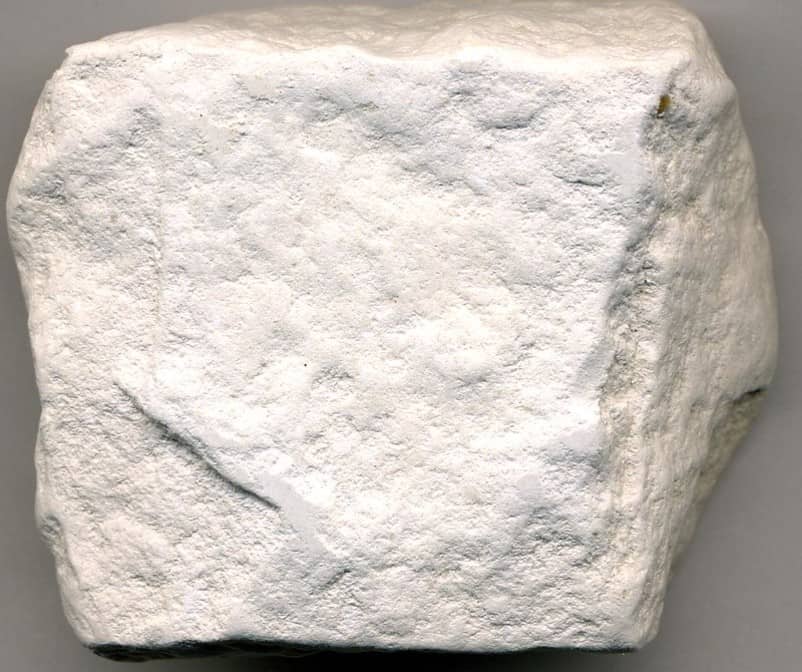
How to Repel Asian Beetles in Future
Here is info on how to keep Asian beetles away in the future. These methods are quite simple and very effective:
- Remove the scent – the beetle scent is what attracts new insects to come so soon. Wipe the surfaces with citronella/ citrus/ wild orange oil to remove it;
- Place bags of cloves and bay leaves all around for a long-lasting repelling effect;
- Treat the outsides with chemicals to create a reliable barrier around windows, roofing, doors, and the foundation;
- Repair your house to exclude.
Top 3 Best Asian Beetles Treatments
I use and recommend these 3 remedies in the majority of cases. They are cost-effective and make getting rid of Asian beetles less time-taking. Read the reviews and apply the products following the instructions.
1. HARRIS Asian Lady Beetle Killer – Best Asian Beetle Killer
[amazon box=”B003YHJ75K” template=”vertical” tracking_id=”how-to-get-rid-of-asian-beetles-20″ button_text=”Check price on Amazon”]
Specifications:
- Item Form: Spray
- Liquid Volume: 32 fl.oz.
- Item Weight: 2.42 pounds
- Item Dimensions LxWxH: 5 x 3 x 12 inches
- Target Species: Asian Lady Beetle, Box Elder
This EPA-registered odorless liquid is officially allowed for indoor use against Asian ladybugs. The bottle comes with a convenient trigger sprayer and an extension pipe that lets you quickly treat the whole house.
One gallon is enough for multiple applications so that you can create a year-round barrier. The liquid doesn’t damage any materials, so it’s safe to use on walls, paint, and fabrics.
| Pros: | Cons: |
|
|
2. Syngenta – A12690A – Demand CS – Best Asian Beetle Pro Insecticide
[amazon box=”B0047IKI2Q” template=”vertical” tracking_id=”how-to-get-rid-of-asian-beetles-20″ button_text=”Check price on Amazon” button_detail=”https://shareasale.com/r.cfm?b=410159&u=2583381&m=43235&urllink=www%2Edomyown%2Ecom%2Fdemand%2Dcs%2Dp%2D46%2Ehtml&afftrack=how%20to%20get%20rid%20of%20asian%20beetles” button_detail_text=”Check price on DoMyOwn”]
Specifications:
- Active Ingredient: lambda-Cyhalothrin 9.7%
- Liquid Volume: 8 fl.oz.
- Item Weight: 10 Ounces
- Item Dimensions LxWxH: 1.8 x 3.65 x 6.05 inches
- Target Species: Ants, Aphids, Bed Bugs, Beetles, Boxelder Bugs, Carpenter Bees, Carpet beetles, Centipedes, Chiggers, Chinch Bugs, Clover Mites, Cluster flies, Cockroaches, Crickets, Earwigs, Fleas, Flies, Grasshopper, Grubs, Gypsy Moth Larvae, Japanese Beetles, Midges, Millipedes, Mites, Mole Cricket, Mosquitoes, Scorpions, Silverfish, Spiders, Termites, Thrips, Ticks, Wasps, Whiteflies and others
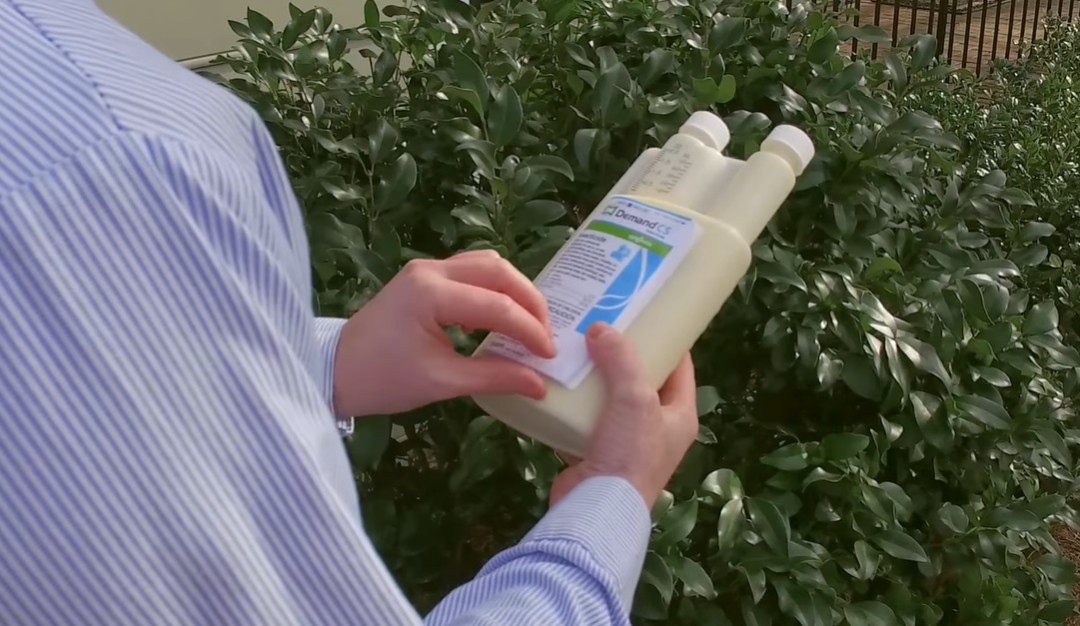
This powerful insecticide offers great value for money. You can spray it around your house twice a year to achieve deadly protection against most insects that may get into your house. Asian beetles usually die within several minutes.
The residual effect of the remedy may last up to 200 days inside structures. I recommend using it only if the infestation gets really tough as it’s very concentrated and controls over 30 insect species.
| Pros: | Cons: |
|
|
3. BUGGSLAYER Insecticide Concentrate – Cost-effective Outdoor Solution
[amazon box=”B008RGJYKQ” template=”vertical” tracking_id=”how-to-get-rid-of-asian-beetles-20″ button_text=”Check price on Amazon”]
Specifications:
- Active Ingredient: Deltamethtin 1.0%
- Liquid Volume: 16 fl.oz.
- Item Weight: 9 ounces
- Item Dimensions LxWxH: 1.8 x 3.8 x 7.4 inches
- Target Species: Elder Bugs, Stink Bugs, Asian Lady Beetles
BUGGSLAYER is an effective outdoor concentrate. A single 16-oz bottle is enough for you to make from 4 to 10 gallons of a deadly brew. You can apply it on any surfaces of the house as it doesn’t leave stains and odors.
I can guarantee that the protective layer will remain effective for 3-4 weeks, depending on weather conditions. That’s usually more than enough for preventing average infestations.
| Pros: | Cons: |
|
|
FAQ
My readers and customers ask these questions very often. I decided to make your ‘fight’ easier and the article more comprehensive. Make sure to remember everything to master Asian beetle control.
What do Asian beetles eat?
The favorite dish of Asian beetles is aphids. In the US, aphids usually live on trees and agricultural crops and gardens. When aphids run out, beetles start looking for fall-ripening apples, grapes, etc. That’s why you should remove them to avoid garden infestations. Fortunately, they don’t congregate on other human foods, animal feces, etc.
What scents do Asian beetles hate?
Asian ladybugs hate such scents as:
- Citronella and citrus – I recommend spraying diluted oils around;
- Bay leaves – bugs always avoid it;
- Peppermint – good repellent and semi-effective natural bug killer;
- Cloves – put it near window sills to scare off the bugs.
Do Asian beetles bite?
Yes. Asian beetles can bite you. It’s usually not very painful but may hurt for a while. If you’re allergic to ladybugs, you may have hives. The bites heal quickly and never cause contamination.
[su_note note_color=”#e5e2d4″]Related post: How to Get Rid of Pincher Bugs [/su_note]
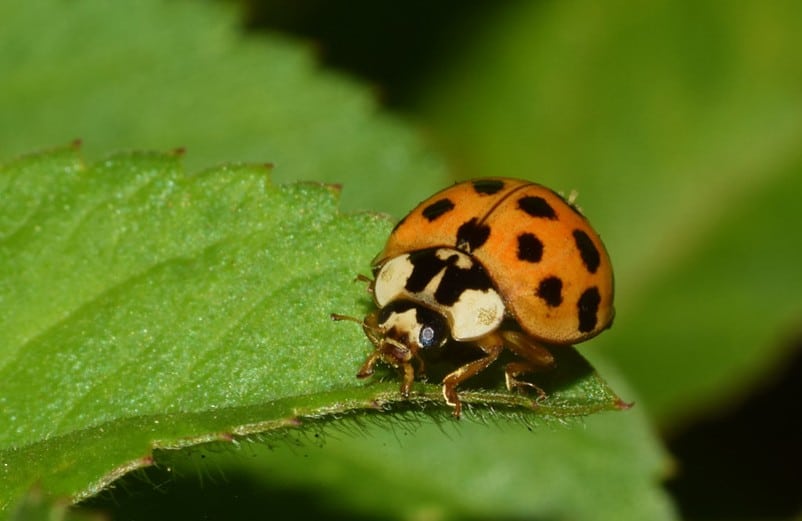
Where do Asian beetles nest?
The list of favorite Asian bug nests includes:
- Bright-lighted south-western walls;
- Attics;
- Ceilings;
- Window frames;
- Space under furniture;
- Behind the walls.
What kills Asian beetles?
The recommended Asian Beetle pesticides for effective management procedures include:
- bifenthrin;
- cyfluthrin;
- cypermethrin;
- deltamethrin;
- β-cyfluthrin
The most efficient natural killer is diatomaceous earth powder. It causes insect dehydration. I prefer indoor chemical treatments anyway as they save a lot of time and don’t dust your property all around.
[su_note note_color=”#e5e2d4″]Related post: Best Grub Killers Reviewed [/su_note]

Just Stop It
Now use your knowledge and the best remedy from my reviews to stop the Asian beetle infestation in your house forever. Don’t forget to protect your property with repellents and fix the breaches to avoid a future reinfestation.
Have you faced such a problem before?
What remedies have you used? If you have any questions on the topic, I’ll be happy to reply in the comments section below. Keep safe!
References:
- Is ‘food grade’ diatomaceous earth okay for pest control? (Oregon State University – National Pesticide Information Center):
http://npic.orst.edu/faq/de.html - Multi-Colored Asian Lady Beetle (MALB) Management Procedures HANDOUT (University of Arkansas System):
https://www.uaex.edu/farm-ranch/pest-management/docs/Multi-Colored%20Asian%20Lady%20Beetle%20MALB%20Pest%20Management%20HANDOUT.pdf

